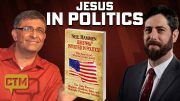Burger King has offered conservative Christian diners a reason to cross the restaurant off their weekly burger cycle. In a nod of support to the aggressive homosexual agenda sweeping the nation, reported USA Today, the fast-food mega-chain has introduced a “gay pride” version of its signature sandwich, the Whopper.
“The Proud Whopper, as it’s called, comes wrapped in a rainbow colored wrapper with this inscription: ‘We are all the same inside,’” reported the paper. Predictably, the gay burger is being especially featured during the July 4 week at Burger King’s San Francisco Market Street location, an area that was “at the heart of the route for last weekend’s 44th annual San Francisco Pride Celebration & Parade,” reported noted USA Today.
Burger King’s promotion of the homosexual agenda comes complete with a two-minute video, featured on YouTube, that attempts to play up the restaurant’s “courage” in standing with the gay community, along with promoting the notion that gay or straight, everyone is the “same inside.”
The ad begins with people questioning the idea of a “gay burger,” and providing such comments as, “I don’t really believe in the homosexual lifestyle,” and, “Do gay people even eat fast food.”
But by the end one woman is visibly moved by the idea of a “proud whopper,” admitting that “I cried [in the restaurant] because I was overwhelmed” by the implied message. And what was that message? It was left to a nine-year-old child to instruct us that “we are all the same inside” really means that “we all have the same rights.” In case the viewer misses the point of the ad, it is re-enforced at the end by a three-year-old girl standing between two women and shouting, “I love my two mommies.”
Fernando Machado, senior vice president for global brand management at Burger King, explained that the campaign is all about showcasing Burger King’s diversity. “It shows how we, as a brand, believe in self-expression,” he said.
USA Today added that the Proud Whopper also demonstrates the chain’s “desire to stay connected to its base of Millennial customers. Gay rights is an issue that reverberates strongly with many Millennials both inside and outside the U.S.” The paper noted that “Burger King also was a sponsor of San Francisco’s gay pride parade. Machado says that’s the first time Burger King has sponsored a gay pride parade in the U.S., though it may have sponsored some outside the country.”
To be clear, the only difference between the traditional Whopper and the gay version is the rainbow colored wrapper, which Machado suggested some patrons were keeping as a collectibles. “Customers were folding the wrappers and taking them home with them,” he said, predicting that they may even end up on E-Bay.
Machado added that for the campaign Burger King changed its 40-year-old slogan, “Have It Your Way” to the more suggestive, “Be Your Way.” Said Machado: “We really want to be more than burgers, fries, and shakes, and occupy a space that’s more meaningful to people.”
One homosexual group, the Gay and Lesbian Alliance Against Defamation (GLAAD) high-fived Burger King for its pro-gay effort, with a GLAAD spokesman saying that when any company voluntarily concedes ground to the homosexual agenda, “it makes a difference. But when it’s done right — when it’s done with a campaign that shows the company understands diversity and really believes in the profound acceptance of other people — that sort of marketing can change minds and hearts at the deepest level.”
Time magazine noted that “in the fast food world, the Proud Whopper campaign puts Burger King in stark contrast to Chick-fil-A, which is still trying to move past anti-same-sex marriage comments made by CEO Dan Cathy, prompting gay couples to stage ‘kiss-in’ protests in 2012.” While Time got the story wrong (Cathy simply made some comments in support of traditional marriage, which prompted a failed boycott of Chick-fil-A by homosexual activists), the response to the Burger King campaign does stand in stark contrast to the efforts of homosexual groups to destroy any entity that does not embrace their militant agenda without question.
Such an effort was on display earlier this year relative to Chick-fil-A, as a sanctimonious city council in a Canadian community voted to ban the restaurant chain from involvement in a televised conference scheduled for the city’s civic center.
Local pastors in Nanaimo, British Columbia, a city of 85,000 people, had sought to rent space in the city’s public venue to broadcast a televised event hosted by Leadercast, an annual leadership conference out of Atlanta. But one of the council members, Fred Pattje, forwarded a resolution to ban the city from allowing the conference, which is streamed to some 800 cities worldwide, when he learned that it was sponsored in part by Chick-fil-A, and included the involvement of Cathy.
The resolution read, in part, “The city of Nanaimo advised the VICC — the Vancouver Island Conference Center — that as owners of the facility any events that are associated with organizations of people that promote or have a history of divisiveness, homophobia, or other expressions of hate … advised VICC to not permit the upcoming Leadercast event to occur in the city-owned facility that is scheduled for Saturday May the 9th.”
In sponsoring the resolution Pattje accused Dan Cathy and Chick-fil-A of having a “rich history of homophobia and other divisive practices…. This is about an organization that is being sponsored by a man who has done tremendous damage.”
Another council member, Jim Kipp, compared Cathy’s beliefs to “organized crime,” claiming that he found them “almost to be a criminal point of view in this day and age…. This is just nuts, it’s just nuts.”
It is likely that the men had no actual knowledge of the Chick-fil-A owner’s real beliefs, but had simply been inspired by the attacks against Cathy and his restaurant chain leveled by other cities and groups. In reality, Cathy simply told an interviewer who asked him about his views on marriage that he and others at the helm of the restaurant chain “are very much supportive of the family — the biblical definition of the family unit. We are a family owned business, a family led business, and we are married to our first wives. We give God thanks for that.”
In a followup interview with syndicated radio host Ken Coleman, Cathy offered a somber warning concerning the nation’s increasingly errant attitude about biblical marriage. “I think we are inviting God’s judgment on our nation when we shake our fist at him and say, ‘We know better than you as to what constitutes a marriage,’” Cathy said. “I pray God’s mercy on our generation that has such a prideful, arrogant attitude to think that we should have the audacity to try to redefine what marriage is all about.”
In subsequent interviews, as homosexual activists attacked him and called for a boycott of Chick-fil-A, Cathy emphasized that his company has never discriminated against homosexuals in hiring or serving as customers, and that anyone is welcome to dine in a Chick-fil-A establishment or work for the company.
Nonetheless, as shown in the minutes from the Nanaimo city council’s May 5 meeting, council members voted 8 to 1 to cancel the event because of Cathy’s and Chick-fil-A’s involvement.
The only dissenting vote came from councilman Bill McKay, who pointed out to his government colleagues that in addition to Cathy, participants would include South African Bishop Desmond Tutu, a vocal supporter of the homosexual agenda, and former first lady Laura Bush, who has expressed her support for same-sex “marriage.”
The actions of the city council generated a hail storm of criticism throughout Canada, with one leading conservative Canadian commentator, Ezra Levant, arguing that the local officials were guilty of “shocking bigotry” against the Christian faith. “Councilors took turns defaming the convention, Chick-fil-A, one of its speakers, its organizers and those in it — all without the burden of facts,” Levant wrote in a column published by the Toronto Sun. “They falsely accused one conference speaker of being anti-gay — even though city staff reminded councilors that the conference wasn’t about homosexuality at all.”
Another secular commentator wrote that he was “deeply shocked” by the actions “and hope that these councilors pay dearly for this. I am ashamed to be Canadian. I am not a Christian, but I defend [the Cathys’] right to their beliefs. The conference itself has nothing to do with what these councilors are alleging.”
Ultimately the Nanaimo city council bowed to the criticism (though too late for the Leadercast conference), issuing a statement confirming that “men and women of all faiths are guaranteed the fundamental freedoms of conscience and religion and of thought, belief, opinion, and expression and freedom of peaceful assembly and freedom of association in accordance with the Canadian Charter of Rights and Freedom and of the Human Rights Code of BC. Accordingly, men and women of all faiths are entitled to utilize facilities that are owned by and/or in the control of the City of Nanaimo in the same manner that any such facilities are available for use by all members of the general public, subject always to the rule of the law.”




